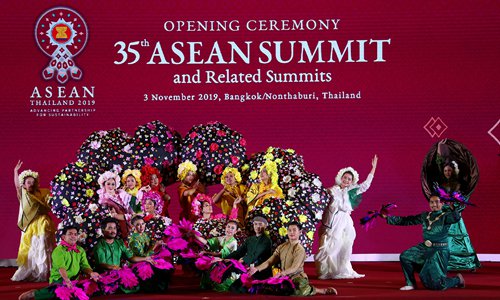HOME >> OPINION
Focus on trade wisest choice for ASEAN
Source:Global Times Published: 2019/11/3 21:58:39

Photo: VCG
The 35th ASEAN Summit and related summits kicked off in Bangkok on Sunday. The meetings will focus on economic cooperation. Whether negotiations for the Regional Comprehensive Economic Partnership (RCEP), which was initiated by ASEAN and joined by 16 countries, can make decisive progress has caught enormous attention.
The US has only sent a low-profile delegation and hoped that the meetings could discuss more about South China Sea issues, which makes Washington not the center of the agenda.
That ASEAN put economic cooperation as the priority for the summit is a rational move. Economic cooperation is ASEAN's advantage where it can play a leading role. If the RCEP can be signed, it will become the world's biggest free trade zone with ASEAN at the core. If geopolitics overrides economic cooperation, ASEAN wouldn't have much say or organizing capability.
Washington's economic engagement with the East Asian region is declining, but the US has been playing an ever-active role in the region's political and military affairs. ASEAN holds a strong initiative when it comes to economics, but in geopolitics the member states will feel squeezed amid the competition between major powers and can easily be exploited by external forces.
ASEAN has about 600 million people. Its economy is not that developed and is influenced by a number of major powers. It can easily be torn apart by tense geopolitical games. The unity of ASEAN member states bears great importance to each of the countries. Taking part in international competition as a whole and enhancing the region's discourse power is in the common interest of regional countries.
China has understood and catered to such interests of ASEAN. China has to a maximum extent coordinated with ASEAN in various fields and let ASEAN play the role of convener in these exchanges. China has, from the very beginning, supported the ASEAN-launched RCEP negotiations and adopted a positive attitude toward other mechanisms either participated in or led by ASEAN.
However, the US is keen only on containing China in the region. Whether the rebalancing the Asia-Pacific strategy during the Obama era or the Indo-Pacific Strategy endorsed by Trump, the US has viewed ASEAN as a lever that it can take on while turning a blind eye to the proposals ASEAN raised to secure its interests.
The primary task of almost all ASEAN members is to realize development. Since the internal markets of these countries are relatively small, the precondition for their sustainable development is regional peace and stability. There are disputes in the South China Sea. Some ASEAN members have conflicts with each other. Certain countries also face serious internal woes. Not letting these conflicts intensify and avoiding them to affect the overall trajectory of the countries and the Southeast Asian region fits the interests of all ASEAN members.
The opinion sphere of ASEAN countries can be easily guided by the powerful Western opinion organs. Where should the South China Sea disputes be placed? What are the relations between the disputes and the development of ASEAN members? How should China's rise be viewed? The interests of the US and the West often infiltrate into the opinion sphere of ASEAN and have an influence on discussions of these questions.
The US-launched trade war has exerted negative impacts on the ASEAN economy. When crafting its economic policies, Washington obviously did not take the interests of ASEAN into account. This serves as a reminder to Southeast Asian people that they are in a disadvantageous position in their interaction with the US and they must safeguard their own interests with a firm and independent stance.
Posted in: EDITORIAL